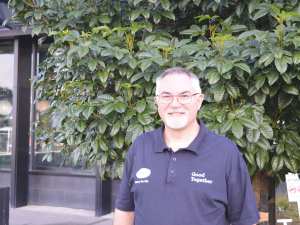Battle for milk
OPINION: Fonterra may be on the verge of selling its consumer business in New Zealand, but the co-operative is not keen on giving any ground to its competitors in the country.
 Marc Rivers says Fonterra's annual results make all the blood, sweat and tears of the last five years worth it.
Marc Rivers says Fonterra's annual results make all the blood, sweat and tears of the last five years worth it.
Fonterra's departing chief financial officer Marc Rivers says delivering the co-op's annual results for the final time made for an emotional day.
There were mixed feelings: proud to be delivering a great result and sad that he will miss out on the next chapter in the co-op's journey.
Rivers, who stepped down from the role on September 30, will bid farewell to Fonterra's farmer shareholders at the co-op's annual meeting in Rotorua next month.
Rivers joined Fonterra in 2018, the year in which the co-op posted its first financial loss.
With Rivers at his side, then interim chief executive Miles Hurrell announced a major review of overseas assets and partnerships.
The co-op decided to focus on extracting value rather than pursue volume and put the focus back on its New Zealand milk pool. Two years later the co-op was back in the black. Last month the co-op announced a net profit of $583 million for the last financial year, on the back of revenues totalling $23.4 billion.
Rivers says he is proud of the results.
"It makes all the blood, sweat and tears of the last five years worth it - that's what it's all about," he told Dairy News.
He agrees that turning the co-operative around was quite a journey.
"Where we started, the difficulties we faced at the beginning, and then to see the first fruits of the new strategy and direction emerge," he says.
Rivers believes the co-operative is on the cusp of a new and exciting chapter.
"The next chapter is really bright and will be exciting for Fonterra. I guess I will be cheering from the sidelines."
Rivers believes that, after the 2018 results, it was clear that Fonterra had to change and everyone could see that.
As the CFO, Rivers had direct interactions with key customers from the around the globe.
He confirms that the co-operative has a great reputation overseas.
"I know from my direct interaction with global customers like Nestle. They really admire what the NZ farmer has done, in a quite entrepreneurial way and on their own.
"They have built up an amazing industry."
Fonterra is also one of the world's biggest exporters of dairy products, reaching out to as many countries as they are able to from a trade perspective.
Rivers says customers admire the technology and innovation achieved by Fonterra on proteins and products like mozzarella cheese.
The co-op's ability to deliver products to global customers during the pandemic was also much appreciated.
"Our supply chain reliability through a very disruptive period enhanced our reputation. Kotahi has been very valuable."
Rivers believes Fonterra's optimised manufacturing footprint, allowing it to divert milk into anything it needs to and responds to customer signals, was also highly valued.
Also setting Fonterra apart from other dairy producers is its sustainability story.
"We produce milk in a beautiful way. Our grass-based system is the lowest carbon way of producing that form of nutrition.
"That doesn't mean that we stand still, we have to keep getting better at that."
The World Wide Sires National All Day Breeds Best Youth Camp Best All Rounder plaudit has become family affair, with 2026 Paramount Cup winner Holly Williams following in her sister Zara's footsteps.
DairyNZ is giving New Zealand farmers a unique opportunity to gain hands-on governance and leadership experience within the dairy sector.
Herd improvement company LIC has posted a 5.2% lift in half-year revenue, thanks to increasing demand for genetics.
According to the latest Fresh Produce Trend Report from United Fresh, 2026 will be a year where fruit and vegetables are shaped by cost pressures, rapid digital adoption, and a renewed focus on wellbeing at home.
The Roar is a highlight of the game hunting calendar in New Zealand, with thousands of hunters set to head for the hills to hunt male stags during March and April.
OPINION: The past few weeks have been tough on farms across the North Island: floods and storms have caused damage and disruption to families and businesses.
OPINION: Fonterra may be on the verge of selling its consumer business in New Zealand, but the co-operative is not…
OPINION: What does the birth rate in China have to do with stock trading? Just ask a2 Milk Company.